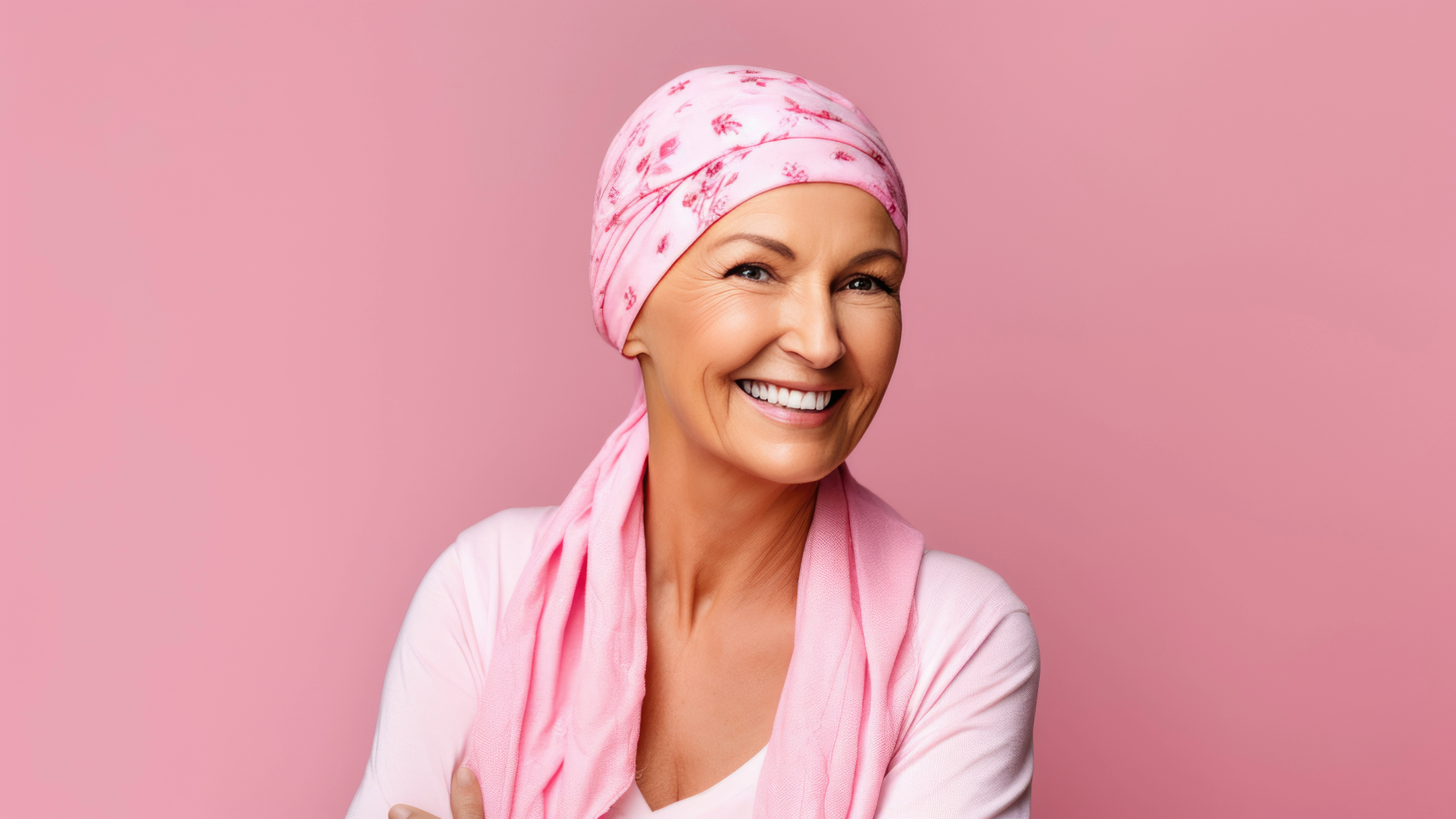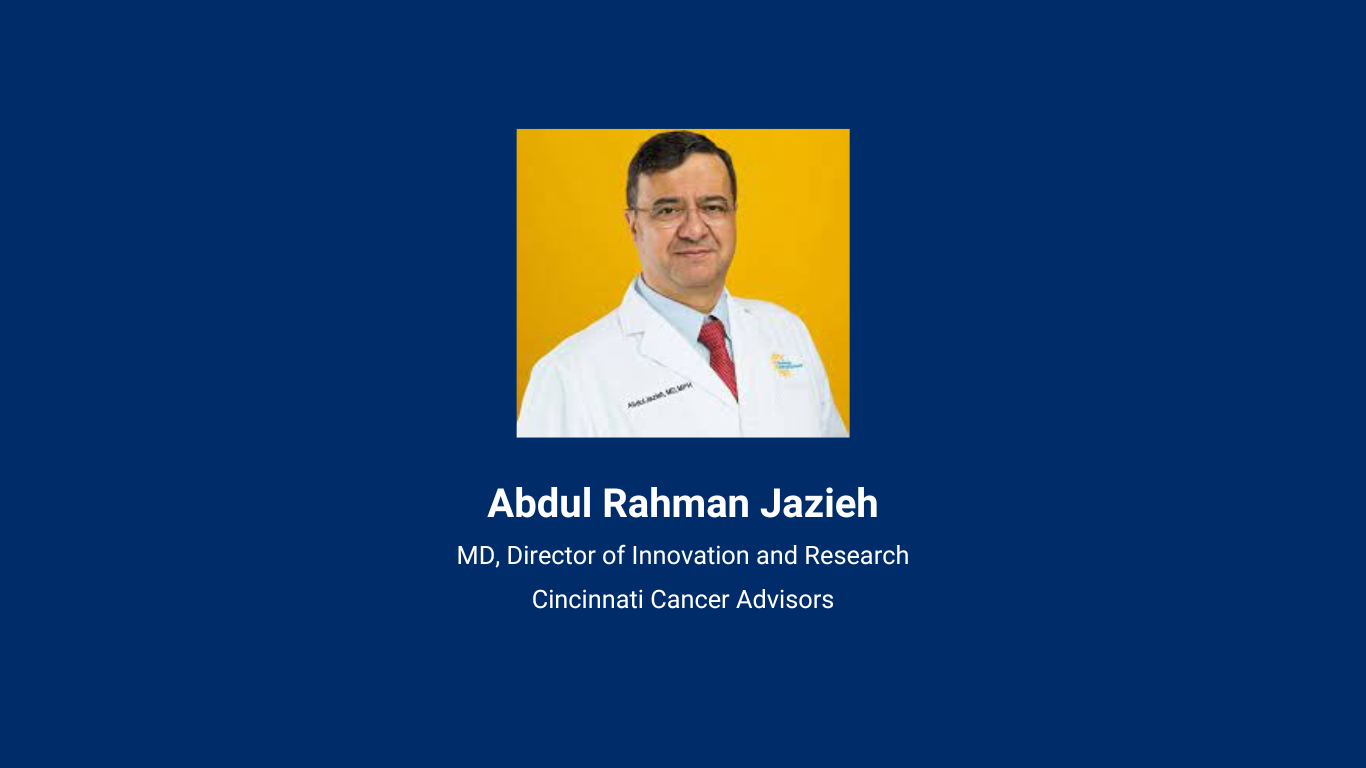Navigating the Path of Cancer Care with Dr. Abdul Rahman Jazieh

Dr. Abdul Rahman Jazieh, a renowned oncologist, is deeply committed to enhancing the health and well-being of cancer patients.
In his capacity as a senior oncology consultant, Director of Innovation and Research, and Director of International Programs at Cincinnati Cancer Advisors, he leads with a strong focus on evidence-based oncology. Notably, he has served as the editor-in-chief of the Global Journal on Quality and Safety in Health Care, held a prominent position in the American Society of Clinical Oncology, and established the Association of VA Hematology Oncology.
Dr. Jazieh's extensive work, which includes over 150 publications, has earned him recognition and the Unsung Hero Award from Cancer Family Care. His global perspective and dedication continuously enhance Cincinnati Cancer Advisors' oncology care.
During my time in medical school, I became acutely aware of the limited treatment options available to cancer patients and the scarcity of individuals interested in oncology,” Dr. Jazieh said “There was a pressing need for both healthcare providers and significant advancements in this field. I firmly believed that I could make a meaningful contribution to oncology by offering much-needed care to those in greatest need, all while contributing to the progression of oncology science through research opportunities."
Highlighting the unique nature of the cancer care journey, Dr. Jazieh observed that, unlike most health conditions, cancer patients are often labeled by their diagnosis in discussions.
"When it comes to cancer, it's a distinct scenario. People frequently refer to someone as 'the one with cancer,' vividly illustrating the profound social and psychological impact on both the patient and their broader social circle,” he said. “In contrast, for other chronic or life-threatening diseases, we typically don't define someone solely by their condition. For instance, if a person has diabetes, you might initially think of them as 'the one with diabetes,' but it doesn't dominate your perception of them. However, with cancer, the label of 'cancer patient' tends to stick like an indelible mark. This applies not only to the immediate family but also to friends, coworkers, and anyone acquainted with the patient."
Dr. Jazieh stressed several key considerations for cancer patients and their families when facing a diagnosis.

"Cancer is not a death sentence, and I want to be abundantly clear about that,” he said. “In fact, cancer offers a better chance of cure than any other chronic disease. Remarkably, approximately 60% of cancer patients achieve total cure, and in some instances, the rate of cured cancer patients reaches an astounding 99% or 100%. I want to assure you that what I'm discussing is not mere science fiction or wishful thinking; there is solid evidence supporting it."
He also acknowledged that lingering negative stereotypes continue to influence perceptions about cancer diagnoses.
"Unfortunately, myths and misconceptions from the past still cast shadows,” Dr. Jazieh said. “We encounter individuals who undergo suffering and treatment without achieving a cure, and those negative experiences leave a more profound emotional impact than positive outcomes."
Furthermore, he emphasized the importance of creating a plan for cancer patients.
"When you look around, you'll find that there are more than perhaps 20 to 40 million people who have successfully battled cancer and are still with us,” he said. “A significant number of cancer survivors exist. However, when a family receives the cancer diagnosis or when a patient themselves gets that news, the most crucial step is to pause, take a deep breath, and avoid making assumptions. Instead, ask, 'How can we approach this?' In the next few moments, we will discuss how families can navigate this journey with the disease because the most effective advocates for the patient are the patient, their caregiver, and the family. By equipping them with knowledge about what to inquire, what to pursue, and what to anticipate, we can hope for a positive outcome."
Dr. Jazieh authored an article titled "The Principles of Oncology Care−Back to Basics," which emphasized five crucial questions considered indispensable. He urged oncologists to consistently address these queries for each patient:

1. Is the diagnosis confirmed? Ensuring the confirmation of a cancer diagnosis stands as the very foundation of any effective treatment plan. Dr. Jazieh underscores the necessity of rigorous diagnostic accuracy. A misdiagnosis or a hasty assumption could lead to inappropriate treatments and unnecessary emotional distress for the patient. Oncologists are tasked with verifying the presence of cancer through precise and thorough examinations, including biopsies, imaging studies, and other diagnostic tests. Only once the diagnosis is firmly established can healthcare providers embark on a well-informed journey to address the condition and provide the most suitable care.
2. What is the type of cancer, and what is the stage of the disease? Understanding the specific type of cancer and its stage is paramount in tailoring a patient's treatment strategy. Dr. Jazieh emphasizes that not all cancers are the same; they vary significantly in their behavior, growth rates, and responsiveness to different therapies. Knowing the type of cancer allows medical professionals to select the most appropriate and targeted treatments, such as chemotherapy, immunotherapy, or surgery. Additionally, determining the stage of the disease, whether it's localized, regional, or metastatic, provides critical insight into how advanced the cancer is and guides decisions regarding the extent of medical interventions. By precisely characterizing the disease, oncologists can offer patients the best chance for successful treatment outcomes and improved quality of life.
3. Is the patient curable? Dr. Jazieh highlighted that this question should take precedence over simply seeking the best treatment. By focusing on the potential for a cure, medical teams can explore all available options, including surgery for stage four cases.
4. If the disease isn't curable, what is the best approach to support the patient? Here, considerations encompass the patient's overall health, wishes, and available treatments, both cancer-directed and supportive therapies.
5. Is the patient a candidate for clinical trials? Dr. Jazieh stressed the importance of not viewing clinical trials negatively, as they offer hope for patients, especially those with incurable diseases. He encouraged patients to seriously consider participating in trials, as they often lead to breakthroughs in treatment.
Dr. Jazieh emphasized the significance of continuously questioning the diagnosis, stage, and treatment options, as diagnostic errors can occur. They also underscored the role of the patient in providing valuable feedback and encouraged patients to participate in research, particularly clinical trials, which can offer innovative solutions and ultimately become the standard of care.
In addition to his medical expertise, Dr. Jazieh reveals a poetic side to his personality. To experience more of his talents and gain deeper insights from his interview, tune into the full PX Space podcast episode below, where you can not only hear one of Dr. Jazieh's captivating poems but also delve into his profound perspectives on cancer care, diagnosis, and the significance of clinical trials. Dr. Jazieh's multifaceted approach to his work is sure to leave a lasting impression and provide a holistic understanding of his contributions to the field.

